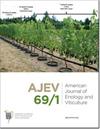Enrichment of Brettanomyces and Other Non-Saccharomyces Fermentative Yeasts from Vineyard Samples in Oregon
IF 1.8
3区 农林科学
Q3 BIOTECHNOLOGY & APPLIED MICROBIOLOGY
引用次数: 0
Abstract
Brettanomyces yeasts remain one of the most important spoilage issues facing the global wine industry. Despite their ubiquitous association with wine and wineries from around the world, there is almost no information on the occurrence of Brettanomyces in vineyards. In this study we used enrichment culturing to successfully isolate Brettanomyces yeasts from 12 of 149 grape berry cluster samples obtained from a vineyard in Oregon over two harvest seasons. This low rate of recovery was consistent with another recent study performed in Italy (Oro et al. 2019) and suggests that Brettanomyces is not a prevalent vineyard yeast genus. In addition to Brettanomyces, we recovered non-Saccharomyces isolates from a further 39 samples. These were predominantly from genera infrequently described in the context of vineyards and winemaking fungal communities, such as Nakazawea, Kazachstania, Lodderomcyes, and Ogataea. By evaluating relative growth capacity and direct competitive fitness, we showed that while some vineyard non-Saccharomyces yeasts are likely to be out-competed in enrichment media by Brettanomyces, others can interfere with Brettanomyces recovery. This may partly explain why Brettanomyces vineyard populations are rarely described. Our results pave the way for further studies of Brettanomyces from non-fermentation origins and demonstrate that enrichment culturing can be applied to reveal other rare vineyard yeast populations.从俄勒冈州葡萄园样品中富集酿酒酵母和其他非酿酒酵母发酵酵母
酿酒酵母仍然是全球葡萄酒行业面临的最重要的腐败问题之一。尽管它们与世界各地的葡萄酒和酿酒厂有着广泛的联系,但几乎没有关于Brettaomyces在葡萄园中出现的信息。在这项研究中,我们使用富集培养从俄勒冈州一个葡萄园的149个葡萄浆果簇样品中的12个中成功分离出Brettaomyces酵母。这种低回收率与最近在意大利进行的另一项研究一致(Oro等人,2019),并表明Brettaomyces不是一个流行的葡萄园酵母属。除了酿酒酵母外,我们还从另外39个样本中回收了非酿酒酵母分离株。这些主要来自葡萄园和酿酒真菌群落中很少描述的属,如Nakazawea、Kazachstania、Lodderomcyes和Ogataea。通过评估相对生长能力和直接竞争适应度,我们发现,虽然一些葡萄园非酿酒酵母可能在富集培养基中被布雷塔酵母所竞争,但其他酵母可能会干扰布雷塔酵母的回收。这可能部分解释了为什么酿酒酵母葡萄园种群很少被描述。我们的研究结果为进一步研究非发酵来源的酿酒酵母铺平了道路,并证明富集培养可以用于揭示其他稀有葡萄园酵母种群。
本文章由计算机程序翻译,如有差异,请以英文原文为准。
求助全文
约1分钟内获得全文
求助全文
来源期刊

American Journal of Enology and Viticulture
农林科学-生物工程与应用微生物
CiteScore
3.80
自引率
10.50%
发文量
27
审稿时长
12-24 weeks
期刊介绍:
The American Journal of Enology and Viticulture (AJEV), published quarterly, is an official journal of the American Society for Enology and Viticulture (ASEV) and is the premier journal in the English language dedicated to scientific research on winemaking and grapegrowing. AJEV publishes full-length research papers, literature reviews, research notes, and technical briefs on various aspects of enology and viticulture, including wine chemistry, sensory science, process engineering, wine quality assessments, microbiology, methods development, plant pathogenesis, diseases and pests of grape, rootstock and clonal evaluation, effect of field practices, and grape genetics and breeding. All papers are peer reviewed, and authorship of papers is not limited to members of ASEV. The science editor, along with the viticulture, enology, and associate editors, are drawn from academic and research institutions worldwide and guide the content of the Journal.
 求助内容:
求助内容: 应助结果提醒方式:
应助结果提醒方式:


